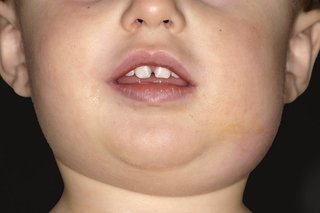Mumps is a viral infection. It is contagious, which means it can spread. Mumps usually happens in children age 4 to 16 and young adults.
You can get vaccinated against mumps. The measles, mumps and rubella (MMR) vaccine is part of the HSE immunisation programme.
You can still get mumps if you had the vaccine but the symptoms and complications are milder.
If you had mumps, it is unlikely you will get it again.
Symptoms of mumps
The most common symptom of mumps is painful swelling of the parotid glands. Parotid glands are salivary glands in the side of the face under the ears.
Your cheeks and jaw may be swollen.

Non-urgent advice: Contact a GP if:
- you think your child has symptoms of mumps
Prevent the spread of mumps
Tell your GP you think your child has mumps before you visit. They can take steps to stop the infection spreading.
How mumps spreads
Mumps spreads in the same way as colds and flu - through infected droplets of saliva. These droplets can be inhaled or picked up from surfaces and transferred into the mouth or nose.
You are usually infectious from 2 days before swelling starts until 5 days after swelling starts.
Protecting your child from mumps
You can protect your child against mumps. Make sure they get the combined MMR vaccine for mumps, measles and rubella.
The MMR vaccine is part of the HSE childhood immunisation schedule.
Two doses of MMR vaccine is around 88% effective against mumps.
Treatment for mumps
There's no cure for mumps. The infection usually passes within 1 to 2 weeks.
But there are some things you can do to help relieve symptoms.
Complications
Mumps usually passes without causing serious health issues. Complications (problems) are rare.
Complications include viral meningitis or swelling of the testicles.
Who is affected by mumps
Most cases of mumps happen in children and young adults who did not get the MMR vaccine as part of their childhood vaccination schedule.
You can also get mumps if you did not have the infection in the past.
If you had mumps before, it is unlikely you will get it again.
The vaccine was introduced in Ireland in 1988. If you or your children missed out on the vaccine, you are more likely to get mumps.
Speak to your GP if you think you may need to get the MMR vaccine.
Content supplied by the NHS and adapted for Ireland by the HSE
